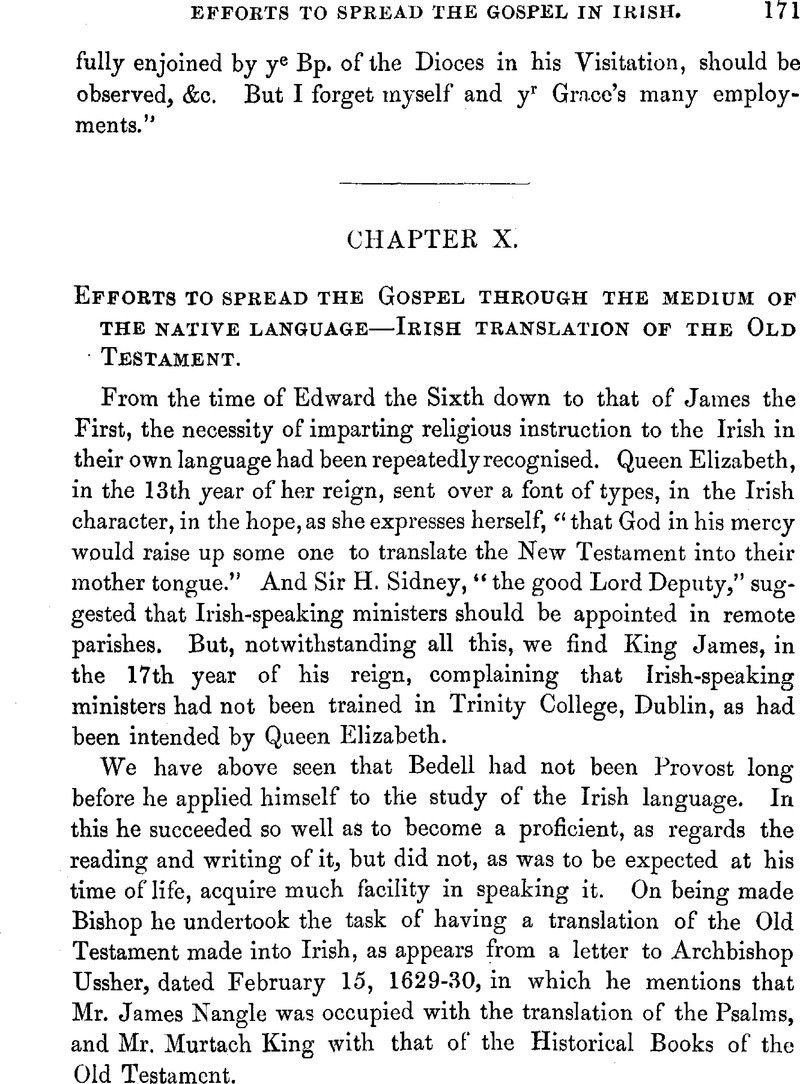No CrossRef data available.
Article contents
Chapter X. Efforts to spread the Gospel through the medium of the native language—Irish translation of the Old Testament
Published online by Cambridge University Press: 24 December 2009
Abstract

- Type
- Supplementary Chapters, Genealogical and Historical, compiled from original sources
- Information
- Copyright
- Copyright © Royal Historical Society 1872
References
page 174 note * Dr. Bramhall appears always to have acted in a cold and unsympathising—even secretly inimical—way towards Bedell's beneficent labours, as appears from his letters to Laud in the Public Record Office, and occasional expressions in Bedell's own letters.
page 174 note † Dr. Antony Dopping, Bishop of Meath, in a letter dated December 14, 1685, to the Rev. * * *, in the Works of the Hon. Robert Boyle.
page 175 note * Hon. Robert Boyle's Life and Works, Appendix No. III.; and Preface to the Second Edition of the Irish New Testament.
page 176 note * Memoir, p. 104.
page 176 note † This extract has been supplied by the Rev. Dr. Reeves, of Tynan, to whom I am indebted for so much original information relating to the subject of this work.
page 177 note * There is in the Public Record Office a copy of these Articles, which had been sent by Bishop Bramhall, of Derry, to Archbishop Laud. The paper is indorsed “Receeved February 28, 1638–9, from the Bp. of Derry, Articles of the High Commission Court in Ireland against King.”
page 179 note * See the Minutes of the Diocesan Synod in the preceding chapter, p. 163.
page 180 note * A pet lamb brought up by hand.
page 180 note † According to what are alleged to have been the true facts, the case of the Bishop of Killala, above related in the text at pp. 52–4, was, in some respects, a counterpart of this of Mr. Murtach King. The Bishopric of Elphin in Ireland having fallen vacant, the Earl of Strafford claimed it for Dr. Henry Tilson, his chaplain, whereas King Charles designed the preferment for another. At this juncture, the scandal against the Bishop of Killala occurred, (see pp. 52–4), and was seized upon as a pretext to deprive him of his Bishopric in order to create a vacancy for the King's nominee, John Maxwell, the refugee Bishop of Ross in Scotland ; and by this notable expedient the wishes of both King and Viceroy, which had come to be to a certain extent at issue, were reconciled.
page 180 note ‡ Mr. William Bayly must have had great interest with King Charles. I do not know whether he was of the same family as Dr. Lewis Bayly (the paternal ancestor of the Marquis of Anglesey's family), who came from Scotland with King James the First as tutor to Prince Henry, and was made Bishop of Bangor. Bayly's career of preferment stands thus:—Jan. 7, 1634, Coll. Vicar of Annageliff; and again, by presentation of the Crown, instituted and inducted, Aug. 7, 1637; and again June 15, 1638. Presented by the Crown to the Vicarage of Templeport Aug. 7, 1637; and again June 15, 1638. Bishop Bedell in his letter to Archbishop Laud dated Novr. 12, 1638, refers to the instrument of this latter presentation as having been produced by Mr. W. Bayly. The renewed presentations by the Crown here mentioned, were made to counteract the sentences of excommunication and privation pronounced against Mr. Bayly by Bishop Bedell. See “Acta Ecclesiastica,” in the preceding chapter.


